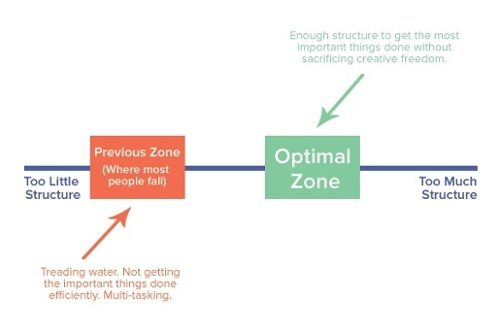Heavy workloads don't have to mean long days at the office. Understand your goals, the impact individual tasks have on your goals, and how much effort is required to complete said tasks, and watch your productivity soar.
According to the Pareto Principle, the majority of results come from a minority of inputs. If this holds true, then you should be able to stay on top of your workload without having to camp out in your office overnight, right?
Rather than provide mediocre results, focus your energy in the right places to ensure multiple projects are completed on time, on budget, and with quality to match. There's also a fine line between too much structure in your work routine, and not enough.
Joelle Steiniger from Crew Blog argues that having too much structure around your workload doesn't leave very much room for those random moments when inspiration strikes.

Photo Credit: Crew Blog
So, how can you organize your workload a little more effectively?
The Social Lite commandments
1) Set daily tasks. When you first get to work in the morning, write down what you need to complete that day, keeping in mind how important a task is and when it's due; then check items off as you go. Not only does checking things off feel so good, but a list gives you a visual account of just how much you have to do.
2) Sort and purge. It's easy to work on familiar, routine projects that don't require much initiation rather than new projects that often require an initial learning process. Make sure you take this into account when planning your time line. Sort your tasks according to deadlines and level of importance, and purge tasks that are unimportant time-wasters. If a task doesn't impact your goal in a big way, bump it down the list. You'll quickly notice that most tasks will fall in quadrant 3 on the priority map below.

Photo Credit: Crew Blog
3) We have calendars for a reason. Schedule every single task you have to do over the week and you'll have a much better sense of what you can reasonably accomplish at any given time. Make sure to plan in down time and food breaks throughout the day to keep your focus at a consistent level.
4) Commit. Yes, we dropped the scary "c" word. Some studies have shown that the average person switches his/her context every 3 minutes, not coming back to a task for 27 minutes. Remember, productivity isn't just about how much you produce, but also how well you produce it. Try using the Chrome extension, Momentum, to set your "main focus" for the day. You also get a cool inspirational picture and quote, because who doesn't like those? Momentum allows you to pause, reflect, and stay focused by reminding you of what needs to be done.

Photo Credit: Momentum
5) Communicate openly. If you're falling behind, or can't make the original deadline, it's much better to be clear about it and consider asking for an extension in advance rather than failing to deliver and apologizing for it later. Ask for more time and finish a task properly with care, rather than skipping ahead to get it "finished" and losing quality along the way. Don't sacrifice quality, manage client expectations regarding the time line, be open about your progress, and adapt accordingly.
6) Don't be afraid to show that you're good at your job. You've spent years studying and working in your chosen profession. Use that knowledge! Clients will respect boundaries you set on your time, they'll appreciate your ideas and input, and they'll know they can rely on your judgment, even if it means going in a different direction than they had originally planned. Just make sure you're not a victim of the Dunning-Kruger effect.

Photo Credit: The Quick Word
7) Be perfectly imperfect. Stop getting so hung up on the little details that your perfectionism starts getting in the way of completing a task. Being too focused on tiny details prevents you from actually creating a great concept. We're not saying put out a messy, half-finished product, but understand that your first draft won't be perfect.
8) Get rid of distractions. In an open concept office, look at noise canceling headphones as an investment in yourself.
9) Stop working on the wrong thing at the wrong time. If you're having a hard time starting a project, start on the smallest, easiest part first. You'll find that once you got started, it isn't that difficult. Know when you're most productive and schedule your important tasks then.
"Productivity is about doing the right things with the right quality in the right time frame that deliver the right business outcome." – Eric Morgan, CEO of AtTask
10) Don't be a "yes" person. You never want to get caught in the trap of over promising and under delivering. Always be aware of your upcoming deadlines and existing workload before committing to another project. You don't need to refuse working on the project altogether, but set appropriate time line expectations. If you don't have time to complete a task well, don't take it on. Let someone else be employee of the month for once.

GIF Credit: Giphy
11) Don't assume your way is the only way. Whenever you get the chance, read up on alternative ways to accomplish your tasks. Often you'll find a more efficient method with some simple googling.
12) Relax. Take that lunch break, coffee break, sanity break, or whatever you want to call it and reset your brain. Try to keep one day in your schedule clear so you have some breathing room. We've popularized the notion of being "busy" so much that unless you're busy, you're just not important. Important people need breaks, too.




